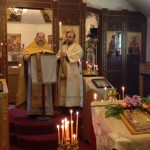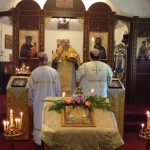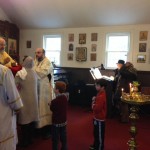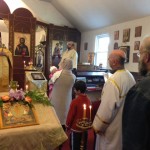On November 2, on the 21st Sunday after Pentecost, Rector of St. George Church, Archpriest Igor Tarasov served the Divine Liturgy. Following the Gospel lesson he preached a homily:
“Today’s Gospel reading is teaching us about death and life after death. The parable about the rich man and Lazarus is about life beyond the grave. It is very much on point today since yesterday the Church celebrated Memorial Saturday, called the Demetrius Saturday. We had to pray for our deceased relatives and other people who departed from this life. Since we did not have a service yesterday, we are going to take a litany for the deceased during today’s Liturgy. We will commemorate the Orthodox Christians who departed from this earthly life. We may recall that these days of fall also Western Christians commemorate the deceased. Today is Catholic Day of the dead, and yesterday was feast of All Saints. Both these days are used to remember the departed. We also know that a couple of days ago many people celebrated Halloween. It also has a connection to the life beyond the grave. But that connection is not Christian. It is a pagan celebration which is reintroduced in the American society. And, of course, we, Orthodox Christians should not participate in that celebration which is rather pagan and satanic. Thus it is very good that today we have to listen to the Gospel lesson talking about life beyond the grave and giving us a Christian, an Orthodox understanding of that.”
“Today we heard what happened to the rich man who lived a good and happy life, but ended up in a place of torment after death. And we heard what happened to a poor beggar named Lazarus who, when he died, was carried by the angels to the bosom of Abraham.”
“As every Gospel lesson, this one contains a lot of thoughts and a lot of important spiritual ideas. First of all, the name of the beggar in the parable. Usually, our Lord Jesus Christ did not give names to the persons in His parables. But here He says that the beggar’s name was Lazarus. This is not famous Lazarus whom Jesus raised from the dead or any other known man. We assume that the person is made up. But the Lord wants us to remember his name. The name Lazarus was popular among the Jews. It means “God the Helper”. A poor but just man, a humble and faithful person whom Lazarus was could hope that when he dies God will help him. “The Lord is my Shepherd” – we hear in the Psalm (Ps. 22, 1) read by the Western Churches at funerals. We, on the other hand read Psalm 90 at our memorial services which starts with the words “He who lives in the help of the Most High” (Ps. 90, 1). In any time, in any place and in any circumstances God helps and leads His people.”
“Another important aspect of today’s parable is that everyone will be judged after death and receive his proper reward. The rich man received torments in hell while Lazarus received eternal happiness on Abraham’s bosom. Here we should note that neither poverty nor riches, in themselves, may gain us salvation or condemnation after death. The rich man goes to hell not because of his wealth, but because of his hardness of heart. His wealth and luxury became only his aids to be indifferent to Lazarus and to his needs, however those riches could become the aids to help Lazarus. Wealth itself does not lwead tp eternal condemnation. Many rich people became Saints. Even today we celebrate the memory of the Great Martyr Artemius. He was a wealthy man, a high-ranked official of the Roman Empire, a general of the imperial army. St. Artemius lived when Christianity became recognized religion in the Empire. He served holy Emperor Constantine. But later, the new Emperor Julian decided to restore paganism and to reject Christianity. In a similar way our modern American society tends to restore pagan culture and to forget its Christian roots. One of those aspects of restoration of paganism is celebration of Halloween. In the 4th century Emperor Julian, called the Apostate, also desired to make Roman society forget about Christian faith. But St. Artemius disagreed. He publicly rebuked the Emperor and refused to renounce Christ. For that he became tortured and executed. St. Artemius was tormented for Christ in this life but received a crown of a Martyr in the eternity. His wealth and a high position did not close the gates of heaven in front of him, for he used that position to defend holy faith.”
“In the same way the rich man in today’s parable could use his wealth to deserve eternal blessedness. He could use it to help Lazarus. But he did not. He did not even notice the poor beggar. Since help from men never really came to poor Lazarus in his earthly life, his only Helper became all-merciful and loving God. Once again we may see why Jesus calls the poor man by this name, “God the Helper”. Helped by God after death Lazarus finds himself on Abraham’s bosom. But again this happens not because Lazarus was poor, but due to his humble faith and righteous life. His poverty could become a great temptation for Lazarus. He could become angry with people or with God for his position; he could be evil, deceptive and become a criminal. But he did not. Thus not riches or poverty save or condemn us, but our deeds, our use or misuse of them.”
“The last aspect we may touch today is that we all should prepare for the hour of our death and secure our salvation. The rich man asks Abraham to send Lazarus to the five brothers of him who are still alive. He wishes to warn them that if they will continue to live with a hardness of heart and indifference toward the needs of others, they will also end up in that place of torment. But Abraham refuses. He says that the living have Moses and the Prophets whom they should hear. He goes further saying that if they “do not hear Moses and the prophets, neither will they be persuaded though one rise from the dead.” (Lk. 16, 31). This is a harsh sentencing. If we who are living do not hear the Law of God, do not keep His Commandments, do not follow the teaching of our Lord Jesus Christ, do not observe the holy traditions of the Church, then we are not going to be persuaded even by a miracle, even if someone will rise from the dead. The fact of a miracle will not convince us to change our life. Only faith is able to inspire us to repent, to turn away from hardness of heart, to do the works of mercy and charity. Only faith and life according to that faith will prepare us for the time of our death. And only faith implemented in the deeds of righteous and humble life will secure our salvation.”
After the Liturgy dismissal the Rector had a short sermon in the Russian language conveying the content of the homily preached before in English.
After the liturgical celebration, the Rector and parishioners enjoyed delicious meals and a good company at the coffee hour.




